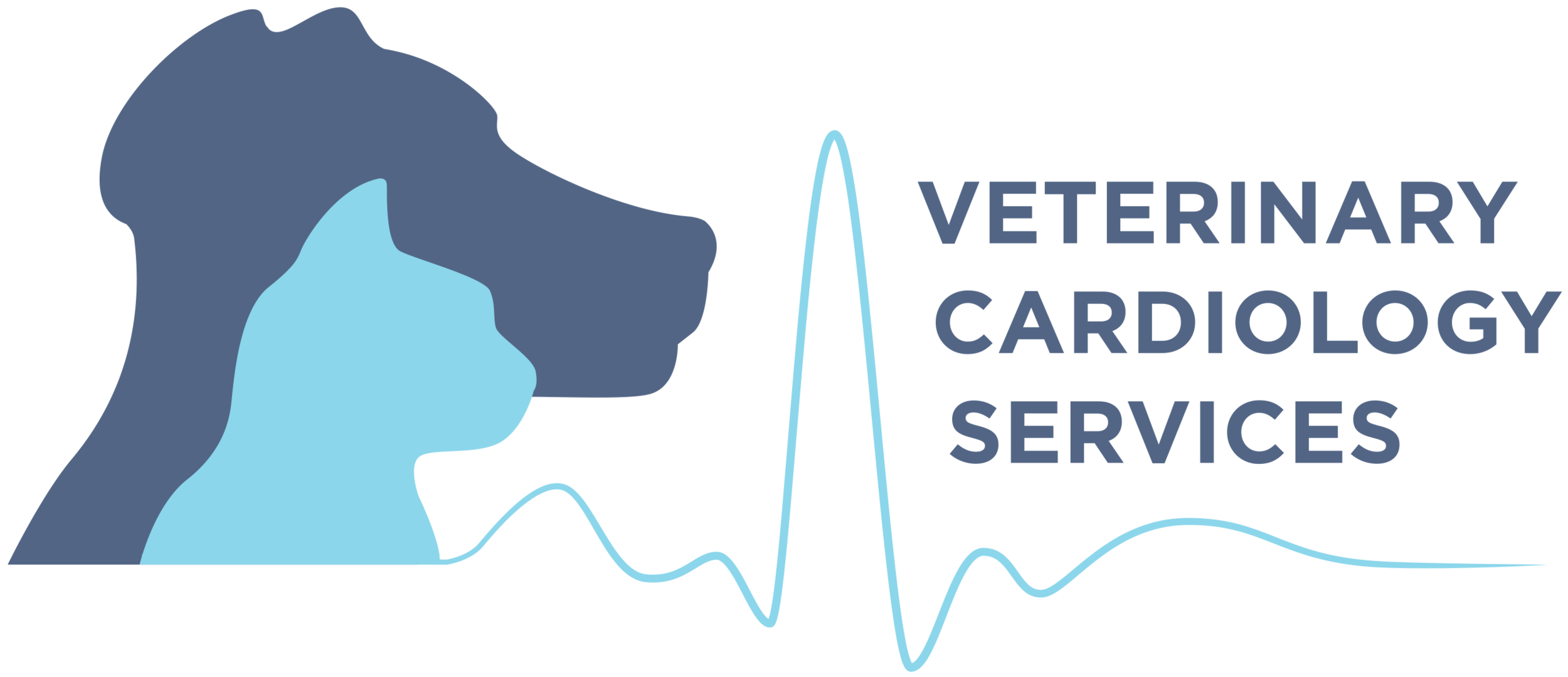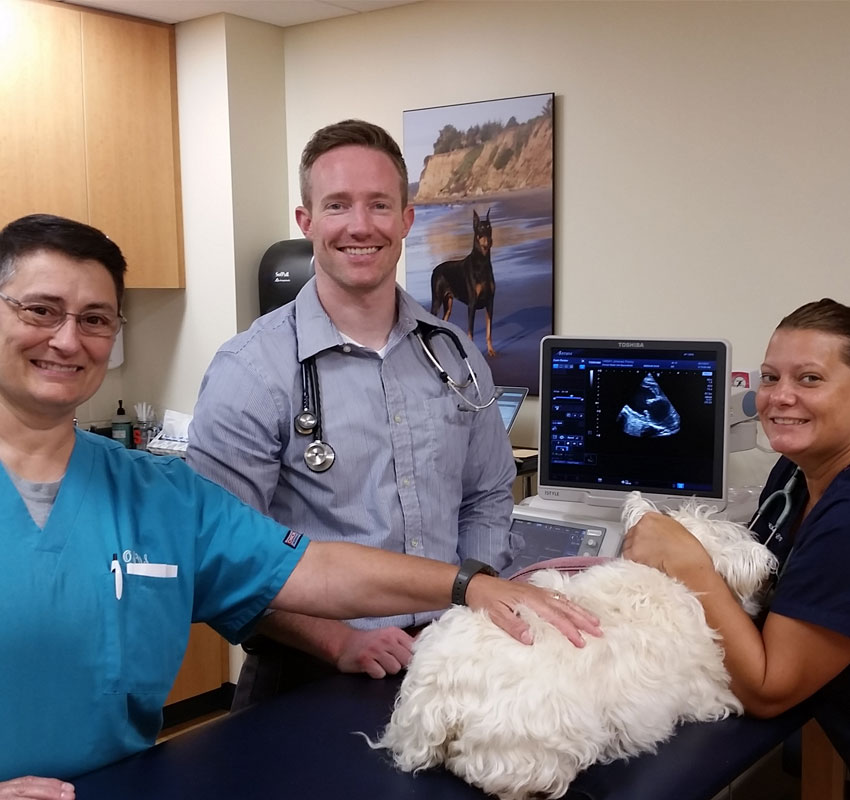Checking Out the Important Providers Provided by a Vet Cardiologist: Understanding Ultrasound and CT Scan Strategies
Veterinary cardiologists play a crucial role in the health and wellness of pet dogs by diagnosing and dealing with numerous heart conditions. They utilize sophisticated imaging strategies, such as heart ultrasound and CT scans, to supply exact examinations. Each approach has its distinct advantages and applications. Comprehending these strategies is vital for pet dog owners seeking the finest look after their companions. What elements should family pet proprietors consider when choosing between these diagnostic devices?

The Role of Vet Cardiologists in Pet Health Care
Vet cardiologists play an essential duty in the healthcare of pet dogs, focusing particularly on diagnosing and dealing with heart-related problems. They possess specialized training that enables them to analyze complex diagnostic examinations and determine different cardio issues. These experts make use of advanced methods, such as echocardiography and electrocardiography, to assess heart function and structure accurately.Veterinary cardiologists also create tailored therapy plans that might include drugs, way of living modifications, and, in many cases, medical interventions. Their proficiency encompasses enlightening pet dog proprietors about heart wellness, stressing the importance of regular check-ups and early detection of potential issues. Cooperation with basic vets is crucial, as it ensures detailed treatment for pets with thought cardiac concerns. By providing specialized services, veterinary cardiologists considerably improve the top quality of life for pet dogs and give tranquility of mind for their owners, reinforcing the importance of heart health and wellness in total family pet wellness.
Common Heart Problems in Family Pets
Typical cardiac concerns in pets can significantly impact their wellness and lifestyle. Heart murmurs, various kinds of cardiomyopathy, and congenital heart issues are amongst one of the most common problems that vets experience. Ultrasound For Dogs. Recognizing these problems is important for pet proprietors to guarantee prompt diagnosis and suitable therapy
Heart Murmurs in Pets
Heart murmurs can be a resource of concern for family pet proprietors, they are not constantly indicative of significant health and wellness concerns. A heart murmur is an uncommon sound generated by unstable blood circulation within the heart. In animals, these whisperings can be caused by different variables, including genetic heart problems, shutoff concerns, and even anxiety throughout evaluations. Several family pets with heart murmurs lead typical lives without considerable wellness impacts. To identify the underlying reason, veterinary cardiologists commonly use diagnostic techniques such as echocardiograms and Doppler ultrasounds. Early detection and analysis are essential, as they may aid manage any prospective cardiac problems properly. Family pet proprietors are urged to consult their vet for a comprehensive examination if a heart whispering is identified.
Cardiomyopathy Kind Explained
Cardiomyopathy includes a team of illness affecting the heart muscle mass, bring about jeopardized heart feature in family pets. One of the most usual kinds include dilated cardiomyopathy (DCM), hypertrophic cardiomyopathy (HCM), and limiting cardiomyopathy (RCM) DCM mostly impacts pet dogs, triggering the heart to expand and compromise, which decreases its capability to pump blood efficiently. In contrast, HCM is more widespread in pet cats, defined by the thickening of the heart walls, frequently resulting in blocked blood circulation. RCM, though much less typical, occurs when the heart muscle becomes inflexible, limiting its ability to loaded with blood. Each type presents one-of-a-kind difficulties in medical diagnosis and treatment, demanding specialized veterinary cardiological evaluation to assure peak management and care for affected animals.
Genetic Heart Problems
Congenital heart flaws represent a significant group of cardiac concerns in animals, distinctive from obtained problems such as cardiomyopathy - Board Certified Veterinary Cardiologist. These issues are architectural abnormalities present at birth, influencing the heart's normal feature. Common types include license ductus arteriosus, ventricular septal defects, and pulmonic constriction. Signs and symptoms may differ widely, varying from light to severe, and can include workout intolerance, coughing, and trouble breathing. Early diagnosis with advanced imaging strategies like ultrasound is vital for reliable management. Veterinary cardiologists play an essential duty in recognizing these problems and advising appropriate treatment choices, which might consist of clinical monitoring or surgical intervention. Acknowledging congenital heart defects enables much better results and boosted lifestyle for affected animals
Comprehending Cardiac Ultrasound: Exactly How It Works
A significant number of veterinary practices currently make use of heart ultrasound as an important diagnostic device for reviewing heart wellness in pets. This non-invasive strategy makes use of high-frequency sound waves to produce pictures of the heart's structure and function. During the procedure, a vet professional uses a gel to the pet's breast and uses a transducer to release ultrasound waves. These waves bounce off the heart and bordering structures, generating real-time photos on a monitor.Veterinarians can evaluate various aspects of heart health, consisting of chamber size, wall motion, and valve feature. In addition, cardiac ultrasound enables for the detection of abnormalities such as fluid accumulation and genetic heart issues. This method is important for detecting problems that may not show up with typical radiographs. By offering detailed info concerning the heart's anatomy and efficiency, cardiac ultrasound aids in formulating effective therapy prepare for animals experiencing heart problem.
The Significance of CT Scans in Diagnosing Heart Conditions
Exactly how do CT scans boost the diagnosis of heart problems in vet medicine? CT scans give detailed cross-sectional images of the heart and surrounding frameworks, enabling vets to picture complex physiological relationships. This imaging method is especially useful in determining hereditary heart issues, cardiac lumps, and problems in blood vessels. By using sophisticated imaging algorithms, CT scans can assess heart chamber dimensions and feature, see this website providing a detailed view that might be challenging to achieve with conventional methods.Additionally, CT angiography can picture blood circulation and identify areas of constriction or blockage, which is important for planning prospective treatments. The rate and accuracy of CT scans likewise promote fast diagnoses, crucial in emergency situations. Inevitably, the incorporation of CT scans into vet cardiology significantly boosts the accuracy of medical diagnoses, making it possible for targeted treatment plans and enhancing patient outcomes for pets experiencing from heart conditions.
Comparing Ultrasound and CT Scan Strategies
While both ultrasound and CT scans are vital devices in veterinary cardiology, they use unique benefits and restrictions that affect their usage in diagnosing heart conditions. Ultrasound, or echocardiography, supplies real-time imaging of the heart's structure and function, enabling vets to evaluate heart chambers, shutoffs, and blood flow. It is specifically reliable for assessing conditions like congestive heart failure and cardiomyopathy. Ultrasound may be restricted in visualizing particular physiological frameworks due to individual size or obesity.In contrast, CT scans deal in-depth cross-sectional photos of the heart and bordering tissues, making them ideal for recognizing architectural problems, tumors, or vascular problems. CT scans offer thorough understandings, they need sedation and may include radiation exposure. Inevitably, the choice between ultrasound and CT checks depends on the certain clinical circumstance, the person's condition, and the information needed for an accurate diagnosis.
Therapy Choices Available Through Vet Cardiology
Vet cardiology supplies a series of therapy options customized to address various heart disease in pets. Therapy strategies typically begin with lifestyle modifications, consisting of diet regimen modifications and exercise modifications, targeted at enhancing general heart health and wellness. Medicines play a vital duty, with cardiologists prescribing medications such as diuretics, beta-blockers, and ACE preventions to boost and manage signs and symptoms cardiac function.In more extreme cases, interventional procedures, such as balloon valvuloplasty or stent positioning, might be essential to ease obstructions or boost blood flow. find For specific congenital heart flaws, medical choices might be checked out to correct architectural concerns. In addition, continuous tracking and follow-up care are essential elements of an extensive treatment strategy, permitting for timely changes based upon the pet dog's feedback to treatment. On the whole, vet cardiology concentrates on giving reliable, customized like maximize the wellness and wellness of animal individuals with heart conditions.
How to Prepare Your Family Pet for a Cardiac Examination
Preparing a pet dog for a heart examination is necessary to guarantee precise results and a smooth procedure. Owners must first set up the appointment with the vet cardiologist and review any kind of particular demands or worries. It is advisable to keep food for at least 12 hours prior to the assessment, as this assists enhance imaging top quality during treatments like ultrasound or CT scans.Additionally, maintaining a calm setting on the day of the appointment can help in reducing the pet's stress and anxiety. It is advantageous to bring along any kind of pertinent medical records, consisting of previous examinations and drugs (Cancer Veterinary Near Me). Proprietors need to also ensure that their family pet is comfy and leashed during transportation to the center. Acquainting themselves with the evaluation process can minimize concerns and aid in asking informed questions during the consultation. By following these steps, proprietors can contribute greatly to the effectiveness of the heart my blog evaluation
Regularly Asked Inquiries
The length of time Does a Heart Ultrasound or CT Check Take?
The period of a cardiac ultrasound usually ranges from 30 to 60 minutes, while a CT check might take about 15 to thirty minutes. Variables such as the individual's condition can influence these time price quotes.

Are There Any Kind Of Dangers Connected With These Analysis Procedures?

Can I Stick With My Pet Throughout the Treatment?
The vet center's plan normally determines whether family pet owners can remain throughout treatments. While some centers motivate owner presence for convenience, others may require separation to assure security and optimal conditions for diagnostic imaging.
Just how much Do These Diagnostic Examinations Normally Expense?
The costs of analysis tests, such as ultrasound and CT scans, generally differ based on location and center. Normally, prices vary from a few hundred to over a thousand bucks, showing the complexity and modern technology entailed.
What Is the Recovery Refine After a Cardiac Evaluation?
The healing process after a heart evaluation entails keeping an eye on the animal for any kind of instant responses, making sure comfort, and limiting exercise. Veterinarians typically give post-evaluation directions to lead animal proprietors throughout this important recuperation period. Heart murmurs, different types of cardiomyopathy, and hereditary heart issues are among the most common problems that veterinarians experience. A heart whispering is an abnormal noise produced by unstable blood circulation within the heart. Cardiomyopathy encompasses a group of illness influencing the heart muscle, leading to jeopardized heart feature in animals. Hereditary heart issues represent a considerable classification of heart concerns in pets, unique from gotten conditions such as cardiomyopathy. Ultrasound, or echocardiography, supplies real-time imaging of the heart's structure and feature, allowing veterinarians to examine heart chambers, shutoffs, and blood flow.
Comments on “How a Cancer Veterinary Near Me Can Support Your Pet’s Quality of Life}”